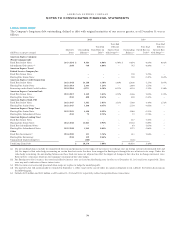American Express 2011 Annual Report Download - page 70
Download and view the complete annual report
Please find page 70 of the 2011 American Express annual report below. You can navigate through the pages in the report by either clicking on the pages listed below, or by using the keyword search tool below to find specific information within the annual report.
AMERICAN EXPRESS COMPANY
2011 FINANCIAL REVIEW
non-accrual in the Company’s TDR disclosures), (ii) reducing
the outstanding balance (in the event of a settlement),
(iii) suspending delinquency fees until the cardmember exits the
TDR program, and (iv) placing the cardmember on a fixed
payment plan not exceeding 60 months. Upon entering the
modification program, the cardmember’s ability to make future
purchases is either cancelled, or in certain cases suspended until
the cardmember successfully exits the TDR program. In
accordance with the modification agreement with the
cardmember, loans with modified terms will revert back to their
original contractual terms (including their contractual interest
rate) when they exit the TDR program, either (i) when all
payments have been made in accordance with the modification
agreement or (ii) in the event that a payment is not made in
accordance with the modification agreement and the
cardmember defaults out of the program. In either case, in
accordance with its normal policy, the Company establishes a
reserve for cardmember interest charges that it believes will not
be collected.
The performance of a loan or a receivable modified as a TDR is
closely monitored to understand its impact on the Company’s
reserve for losses. Though the ultimate success of these
modification programs remains uncertain, the Company believes
the programs improve the cumulative loss performance of such
loans and receivables.
Reserves for cardmember loans and receivables modified as
TDRs are determined by the difference between the cash flows
expected to be received from the cardmember, taking into
consideration the probability of subsequent defaults, discounted
at the original effective interest rates, and the carrying value of
the cardmember loan or receivable balance. The Company
determines the original effective interest rate as the interest rate
in effect prior to the imposition of any penalty rate. All changes
in the impairment measurement, including the component due
to the passage of time are included in the provision for losses
within the Consolidated Statements of Income.
The following tables provide additional information with respect to the Company’s impaired cardmember loans and receivables as of
December 31:
(Millions)
Loans over
90 Days Past
Due &
Accruing
Interest(a)
Non-
Accrual
Loans(b)
Loans &
Receivables
Modified
as a TDR(c)(d)
Total
Impaired
Loans &
Receivables
Unpaid
Principal
Balance(e)
Allowance
for TDRs(f)
2011
U.S. Card Services – Cardmember Loans $ 64 $ 529 $ 736 $ 1,329 $ 1,268 $ 174
International Card Services – Cardmember Loans 67 6 8 81 80 2
U.S. Card Services – Cardmember Receivables – – 174 174 165 118
Total(g) $ 131 $ 535 $ 918 $ 1,584 $ 1,513 $ 294
(Millions)
Loans over
90 Days Past
Due &
Accruing
Interest(a)
Non-
Accrual
Loans(b)
Loans &
Receivables
Modified
as a TDR(c)
Total
Impaired
Loans &
Receivables
Unpaid
Principal
Balance(e)
Allowance
for TDRs(f)
2010
U.S. Card Services – Cardmember Loans $ 90 $ 628 $ 1,076 $ 1,794 $ 1,704 $ 274
International Card Services – Cardmember Loans 95 8 11 114 112 5
U.S. Card Services – Cardmember Receivables – – 114 114 109 63
Total(g) $ 185 $ 636 $ 1,201 $ 2,022 $ 1,925 $ 342
(a) The Company’s policy is generally to accrue interest through the date of charge-off (at 180 days past due). The Company establishes reserves for interest that the
Company believes will not be collected.
(b) Non-accrual loans not in modification programs include certain cardmember loans placed with outside collection agencies for which the Company has ceased
accruing interest. The Company’s policy is not to resume the accrual of interest on these loans. Payments received are applied against the recorded loan balance.
Interest income is recognized on a cash basis for any payments received after the loan balance has been paid in full.
(c) The total loans and receivables modified as a TDR include $410 million and $655 million that are non-accrual and $4 million and $7 million that are pastdue90days
and still accruing interest as of December 31, 2011 and 2010, respectively. These amounts are excluded from the previous two columns.
(d) During the third quarter of 2011, the Company reassessed all cardmember loans and receivables modifications that occurred on or after January 1, 2011, to determine
whether any such modifications met the definition of a TDR under new GAAP effective July 1, 2011. As a result, in the third quarter of 2011 the Company began
classifying its short-term settlement programs as TDRs which had an outstanding balance of $5.8 million and associated reserves for losses of $3.7 million.
(e) Unpaid principal balance consists of cardmember charges billed and excludes other amounts charged directly by the Company such as interest and fees.
(f) Represents the reserve for losses for TDRs, which are evaluated separately for impairment. The Company records a reserve for losses for all impaired loans. Refer to
Cardmember Loans Evaluated Separately and Collectively for Impairment in Note 5 for further discussion of the reserve for losses on loans over 90 days past due and
accruing interest and non-accrual loans, which are evaluated collectively for impairment.
(g) These disclosures are not significant for cardmember receivables in ICS and GCS.
68
























